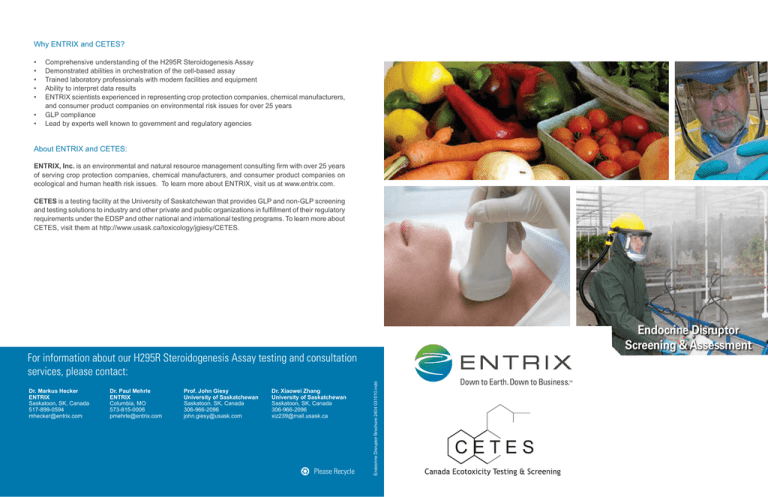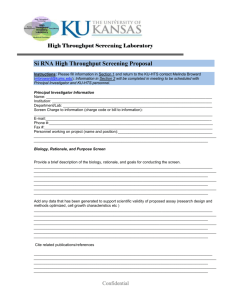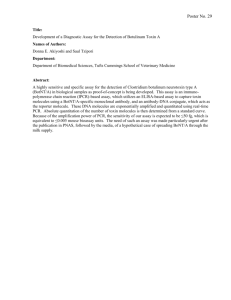Why ENTRIX and CETES?
advertisement

Why ENTRIX and CETES? • • • • • • • Comprehensive understanding of the H295R Steroidogenesis Assay Demonstrated abilities in orchestration of the cell-based assay Trained laboratory professionals with modern facilities and equipment Ability to interpret data results ENTRIX scientists experienced in representing crop protection companies, chemical manufacturers, and consumer product companies on environmental risk issues for over 25 years GLP compliance Lead by experts well known to government and regulatory agencies About ENTRIX and CETES: ENTRIX, Inc. is an environmental and natural resource management consulting firm with over 25 years of serving crop protection companies, chemical manufacturers, and consumer product companies on ecological and human health risk issues. To learn more about ENTRIX, visit us at www.entrix.com. CETES is a testing facility at the University of Saskatchewan that provides GLP and non-GLP screening and testing solutions to industry and other private and public organizations in fulfillment of their regulatory requirements under the EDSP and other national and international testing programs. To learn more about CETES, visit them at http://www.usask.ca/toxicology/jgiesy/CETES. Endocrine Disruptor Screening & Assessment Dr. Markus Hecker ENTRIX Saskatoon, SK, Canada 517-899-0594 mhecker@entrix.com Dr. Paul Mehrle ENTRIX Columbia, MO 573-815-0006 pmehrle@entrix.com Prof. John Giesy University of Saskatchewan Saskatoon, SK, Canada 306-966-2096 john.giesy@usask.com Dr. Xiaowei Zhang University of Saskatchewan Saskatoon, SK, Canada 306-966-2096 xiz239@mail.usask.ca Please Recycle Endocrine Disruptor Brochure 2404 031010.indd For information about our H295R Steroidogenesis Assay testing and consultation services, please contact: Endocrine Disruptor Screening & Assessment Let Our Experts Help You Testing and Consultation to Meet the U.S. EPA’s Regulatory Requirements for Induction and Inhibition of Hormone Production under the EDSP Using the H295R Steroidogenesis Assay (http://www.epa.gov/endo/) In response to emerging concerns that substances may alter the function of endocrine systems and result in adverse effects to human health, the U.S. Congress included a provision in the Food Quality Protection Act of 1996 adding section 408 to the Federal Food Drug and Cosmetic Act (FFDCA). This section of the FFDCA requires U.S. Environmental Protection Agency (EPA) to: ... develop a screening program, using appropriate validated test systems and other scientifically relevant information, to determine whether certain substances may have an effect in humans that is similar to an effect produced by a naturally occurring estrogen, or other such endocrine effect as the Administrator may designate [21 U.S.C. 346 (p)]. In fulfillment of these requirements, EPA has been developing and validating in vitro and in vivo assays to determine the potential of chemicals to interact with the endocrine systems and related functions in humans and wildlife. The EPA is recommending a two-tiered approach in the evaluation process. The Tier 1 Screening battery of assays is based on EPA’s Endocrine Disruptor Screening and Testing Advisory Committee (EDSTAC) recommendations and aims to identify chemicals affecting the estrogen, androgen, and thyroid hormone systems. Tier 2 testing is intended to confirm, characterize and quantify those effects for estrogen, androgen, and thyroid active chemicals. Included in EPS’s EDSP Tier 1 Screening battery is the cell-based H295R Steroidogenesis Assay which uses the H295R human adrenocortical carcinoma cell line. The H295R Steroidogenesis Assay is currently in the last phase of validation of the Test Method Validation Program for the Organization for Economic Cooperation & Development (OECD), which will ultimately result in the development of an OECD Test Guideline for assessing the potential of chemicals to affect steroid hormone synthesis. ENTRIX. and the Toxicology Centre at the University of Saskatchewan have developed and validated the H295R Steroidogenesis Assay with research grants from the EPA as part of EPA’s EDSP and OECD’s method validation program. The project has been directed by Professor John P. Giesy, Ph.D. of the University of Saskatchewan’s Toxicology Centre and Dr. Markus Hecker of ENTRIX. Drs. Giesy and Hecker have been instrumental in the development and validation of the test protocols and the quality criteria guidelines required by regulatory agencies. In addition, Professor Giesy and ENTRIX scientists have an excellent understanding of the endocrine disruptor issues through their years of research and have numerous publications in the area of chemical-induced effects on endocrine function. EPA published in the Federal Register a list of 73 pesticide active ingredients and HPV/pesticide inert chemicals selected for initial Tier 1 screening. This initial list for testing was prioritized from a universe of 87,000 chemicals included on the TSCA inventory, active pesticide ingredients, and ingredients in cosmetics and food additives. In response to these upcoming screening requirements, Canada Ecotoxicity Testing & Screening (CETES) was founded at the University of Saskatchewan to provide clients Good Laboratory Practice (GLP) -compliant testing solutions in support of their testing requirements under EPA’s EDSP and other mandatory national or international testing programs world wide. ENTRIX and CETES offer: To assist chemical manufacturers in responding to the regulatory requirements of the EPA and OECD for Tier 1 endocrine disruptor screening, ENTRIX and CETES offer clients: Testing & Consultation to Identify Chemical Inducers and Inhibitors of Hormone Production Using the H295R Steroidogenesis Assay • Conduct of the H295R Steroidogenesis Assay • Data Interpretation & Potential Environmental Risks • Implications for Future Testing Requirements • Representation before Global Regulatory Authorities Conduct of the H295R Steroidogenesis Assay • CETES at the Toxicology Centre, University of Saskatchewan, has demonstrated abilities in screening chemicals using the H295R Steroidogenesis Assay • Development and validation as part of EPA’s EDSP and OECD’s method validation program of the cell-based assay were conducted at the Toxicology Centre • Excellent “State of the Art” laboratory facilities • Laboratory professionals experienced in all facets of the assay: – cell culture techniques; – chemical exposure; – conduct of the assay; and – report preparation Endocrine Disruptor Screening & Assessment Let Our Experts Help You Testing and Consultation to Meet the U.S. EPA’s Regulatory Requirements for Induction and Inhibition of Hormone Production under the EDSP Using the H295R Steroidogenesis Assay (http://www.epa.gov/endo/) In response to emerging concerns that substances may alter the function of endocrine systems and result in adverse effects to human health, the U.S. Congress included a provision in the Food Quality Protection Act of 1996 adding section 408 to the Federal Food Drug and Cosmetic Act (FFDCA). This section of the FFDCA requires U.S. Environmental Protection Agency (EPA) to: ... develop a screening program, using appropriate validated test systems and other scientifically relevant information, to determine whether certain substances may have an effect in humans that is similar to an effect produced by a naturally occurring estrogen, or other such endocrine effect as the Administrator may designate [21 U.S.C. 346 (p)]. In fulfillment of these requirements, EPA has been developing and validating in vitro and in vivo assays to determine the potential of chemicals to interact with the endocrine systems and related functions in humans and wildlife. The EPA is recommending a two-tiered approach in the evaluation process. The Tier 1 Screening battery of assays is based on EPA’s Endocrine Disruptor Screening and Testing Advisory Committee (EDSTAC) recommendations and aims to identify chemicals affecting the estrogen, androgen, and thyroid hormone systems. Tier 2 testing is intended to confirm, characterize and quantify those effects for estrogen, androgen, and thyroid active chemicals. Included in EPS’s EDSP Tier 1 Screening battery is the cell-based H295R Steroidogenesis Assay which uses the H295R human adrenocortical carcinoma cell line. The H295R Steroidogenesis Assay is currently in the last phase of validation of the Test Method Validation Program for the Organization for Economic Cooperation & Development (OECD), which will ultimately result in the development of an OECD Test Guideline for assessing the potential of chemicals to affect steroid hormone synthesis. ENTRIX. and the Toxicology Centre at the University of Saskatchewan have developed and validated the H295R Steroidogenesis Assay with research grants from the EPA as part of EPA’s EDSP and OECD’s method validation program. The project has been directed by Professor John P. Giesy, Ph.D. of the University of Saskatchewan’s Toxicology Centre and Dr. Markus Hecker of ENTRIX. Drs. Giesy and Hecker have been instrumental in the development and validation of the test protocols and the quality criteria guidelines required by regulatory agencies. In addition, Professor Giesy and ENTRIX scientists have an excellent understanding of the endocrine disruptor issues through their years of research and have numerous publications in the area of chemical-induced effects on endocrine function. EPA published in the Federal Register a list of 73 pesticide active ingredients and HPV/pesticide inert chemicals selected for initial Tier 1 screening. This initial list for testing was prioritized from a universe of 87,000 chemicals included on the TSCA inventory, active pesticide ingredients, and ingredients in cosmetics and food additives. In response to these upcoming screening requirements, Canada Ecotoxicity Testing & Screening (CETES) was founded at the University of Saskatchewan to provide clients Good Laboratory Practice (GLP) -compliant testing solutions in support of their testing requirements under EPA’s EDSP and other mandatory national or international testing programs world wide. ENTRIX and CETES offer: To assist chemical manufacturers in responding to the regulatory requirements of the EPA and OECD for Tier 1 endocrine disruptor screening, ENTRIX and CETES offer clients: Testing & Consultation to Identify Chemical Inducers and Inhibitors of Hormone Production Using the H295R Steroidogenesis Assay • Conduct of the H295R Steroidogenesis Assay • Data Interpretation & Potential Environmental Risks • Implications for Future Testing Requirements • Representation before Global Regulatory Authorities Conduct of the H295R Steroidogenesis Assay • CETES at the Toxicology Centre, University of Saskatchewan, has demonstrated abilities in screening chemicals using the H295R Steroidogenesis Assay • Development and validation as part of EPA’s EDSP and OECD’s method validation program of the cell-based assay were conducted at the Toxicology Centre • Excellent “State of the Art” laboratory facilities • Laboratory professionals experienced in all facets of the assay: – cell culture techniques; – chemical exposure; – conduct of the assay; and – report preparation Why ENTRIX and CETES? • • • • • • • Comprehensive understanding of the H295R Steroidogenesis Assay Demonstrated abilities in orchestration of the cell-based assay Trained laboratory professionals with modern facilities and equipment Ability to interpret data results ENTRIX scientists experienced in representing crop protection companies, chemical manufacturers, and consumer product companies on environmental risk issues for over 25 years GLP compliance Lead by experts well known to government and regulatory agencies About ENTRIX and CETES: ENTRIX, Inc. is an environmental and natural resource management consulting firm with over 25 years of serving crop protection companies, chemical manufacturers, and consumer product companies on ecological and human health risk issues. To learn more about ENTRIX, visit us at www.entrix.com. CETES is a testing facility at the University of Saskatchewan that provides GLP and non-GLP screening and testing solutions to industry and other private and public organizations in fulfillment of their regulatory requirements under the EDSP and other national and international testing programs. To learn more about CETES, visit them at http://www.usask.ca/toxicology/jgiesy/CETES. Endocrine Disruptor Screening & Assessment Dr. Markus Hecker ENTRIX Saskatoon, SK, Canada 517-899-0594 mhecker@entrix.com Dr. Paul Mehrle ENTRIX Columbia, MO 573-815-0006 pmehrle@entrix.com Prof. John Giesy University of Saskatchewan Saskatoon, SK, Canada 306-966-2096 john.giesy@usask.com Dr. Xiaowei Zhang University of Saskatchewan Saskatoon, SK, Canada 306-966-2096 xiz239@mail.usask.ca Please Recycle Endocrine Disruptor Brochure 2404 031010.indd For information about our H295R Steroidogenesis Assay testing and consultation services, please contact:




